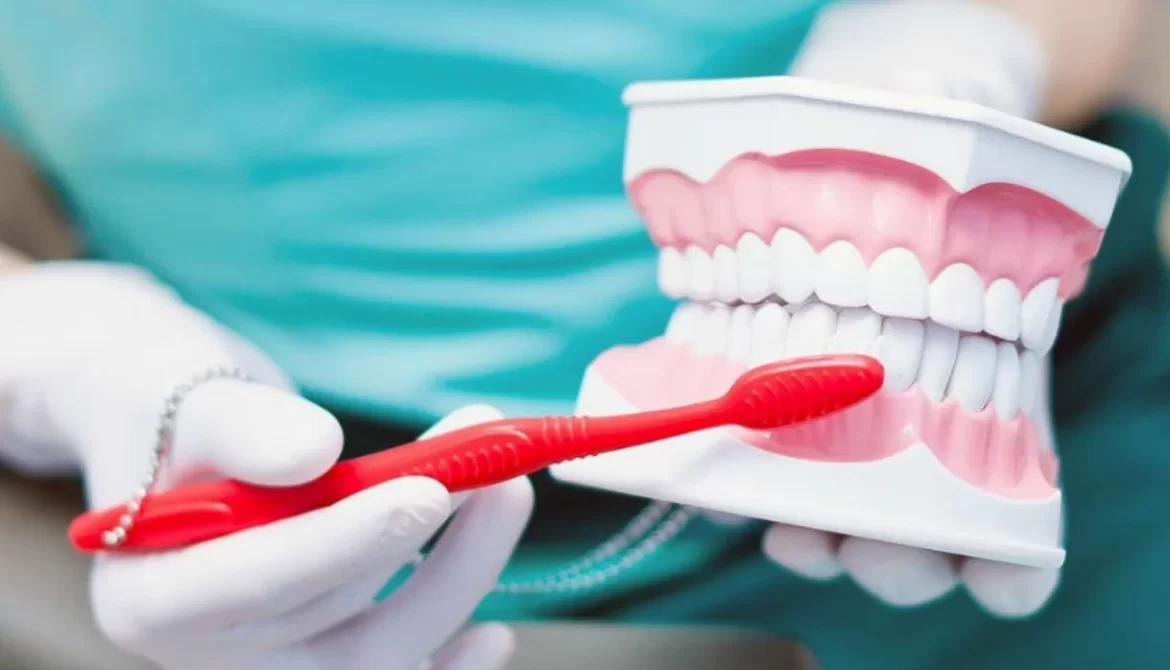At any given moment, we have billions of bacteria in our mouth, some of which are responsible for dental decay and gum disease. Good oral hygiene habits help us control these disease-causing microorganisms.
Oral Hygiene is composed by brushing and flossing teeth and using mouthwash regularly, and also maintaining good food habits and visiting a dentist regularly.
Brushing
Once a day it is very good to brush your teeth to help avoid tooth decay, gum disease and bad breath (halitosis).
Your mouth contains an entire ecosystem of bacteria, some good and some potentially destructive, working alongside each other to break down food into digestible components, but posing problems when they accumulate on teeth and cause plaque that can lead to cavities, gum disease and other oral health complications.
This is in part because, when brushing your teeth, you remove plaque on your teeth that would otherwise form into tartar at the gumline. These are both crucial components of a healthy oral hygiene routine. To complete your oral hygiene regime, you should also floss daily and use mouthwash.
Bad breath can cause many serious diseases such as heart disease, diabetes and cancer.We have seen that other health issues can be caused by bad hygiene of the mouth such as gum diseasecan thus be prevented by good oral hygeine.Infamously, cigarettes can be bad for your health, but brushing your teeth regularly with other components of a healthy diet will not only giv your smile a better apperance but your overall halth.The teeth in your mouth are a mirror to the body down below, and eating well and regularly seeing your dentist and proudly quitting your smoking habit will help keep your smile bright and healthy, as you age into overall health!You will be able to make beautiful smiles as you work towards lasting good health!
Flossing
The mouth acts as the gateway to our digestive systems and is a pathway through which germs can enter the blood, potentially reaching other parts of the body and triggering disease. Regular cleaning keeps infection at bay, reducing the risk of oral problems by limiting the growth of plaque. Brushing away plaque can prevent infections such as tooth decay, gum disease, bad breath (halitosis) and cavities.
Oral bacteria can eat away at the tough covering of your tooth, called enamel, potentially resulting in cavities. At the same time, there are bacteria inside the gum that can feed on food debris stuck to the teeth, leading to swelling, pain and bleeding from the infected gum, more commonly known as gingivitis. Gingivitis can consequently lead to many other health-related concerns, such as cardiovascular disease. Flossing along with regular visits with the dentist can help you keep your mouth a safe and healthy place, vibrant and free from infections and bacteria.
Flossing keeps the plaque buildup clear, thus reducing the bad breath and helping prevent gingivitis (which can progress to worse problems, such as sundowning etc). SIBO is reduced: so gas, bloat, abdominal pain and malnutrition stops there; bacteria can’t travel outside the mouth to the digestive system through the esophagus and stomach lining, so the gas, bloating, abdominal pain and malnutrition stops there too. In some people, gas, bloat, abdominal pain and malnutrition symptoms.
Mouthwash
The antiseptic ingredient, such as cetylpyridinium chloride or menthol, kills the bacteria responsible for halitosis (bad breath), dental caries (cavities) and gingivitis (inflamed gums). They can also contain xerostomia enhancers (for example, sorbitol) or abrasives to remove tartar and plaque from the mouth.
A mouthwash can supplement a regular brushing and flossing regimen by reaching areas not accessible to toothbrushes or dental floss alone. Furthermore, mouthwash can be particularly useful for those who have limitations in manual dexterity or whose impairments impair their ability to rinse, such as those with compromised viscosity or sensory deficits.
Keep in mind that mouthwash is not a substitute for brushing and flossing, and only works if directed by your dentist. Most types of mouthwash ask you to rinse and ‘swish’ the liquid product in your mouth for about 30 to 60 seconds before you spit it out, and therapeutic mouthwashes may help prevent gum decay, plaque build-up, gingival issues and reduce the bacteria that generate odours in your mouth.
Regular Dentist Visits
As the mouth can be a great source of germs, it is important that we brush and floss after every meal and try to cut down the amount of carbs that we eat. It is also good to go to our dentists on a regular basis to ensure that our teeth are healthy While an intake of a certain amount of germs is unavoidable, it can always be managed through regular brushing of our teeth, flossing and a healthier diet with less carbohydrates. Annual appointments to your dentist’s office allow the practitioner to spot tell-tale signs of a developing disease like mouth cancer.
Should you develop oral cancer, it’s a disease you’ll stand a much better chance of surviving if it’s detected early, and you’re far more likely to pick it up early if you see your dentist often. Expect a lecture on brushing and flossing too, together with products that will keep you happy in the professorial chair.
If oral hygiene takes care of yourself, you are taking care of the rest of your health. Regular dentist visits reduces the risk of cardiovascular diseases, Diabetes and other complications in pregnancy. Regular check ups will also prevent gum dis iase if gum dis iase left ignored it leads to tooth loss and other issue if you take care now, you will have smile all your life.




